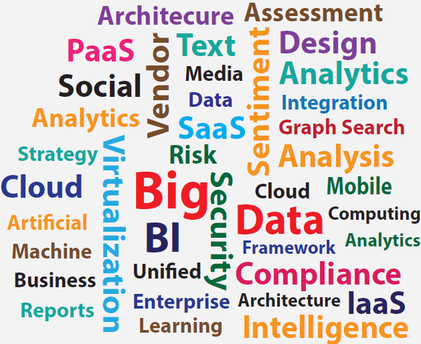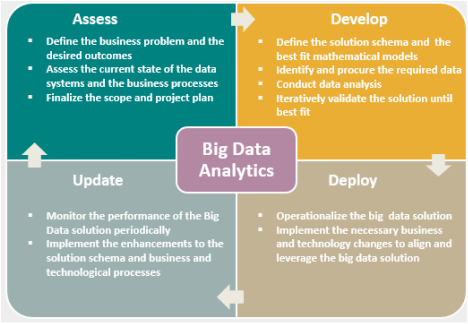
Big Data Analytics
Big Data is not a buzz-word but a key development in the data universe and a key focus for businesses across industries and geographies. Given the speed at which we generate data today, it is indispensable to meet data management requirements for today’s businesses. If you look at the evolution of data universe from earliest mainframe systems in 1970’s to relational databases in 1980 onwards, the present and future belongs to the new paradigm called Big Data. Big Data enables the storage and processing of massively large data sets from a variety of sources generated at such a fast pace that it is impossible to store and process those data with the existing technologies. Development of Massively Parallel Processing Systems, Distributed File Systems and Storage and Processing Technologies in the Big Data arena has made it a real possibility for institutions to leverage the full set of available data from structured and unstructured sources for improved decision making and business innovation.
We divide the Big Data space in two broad categories: Big Data Enablement and Big Data Analytics. Big Data Enablement is the deployment of the Big Data systems into mainstream production and comprise of architecture, storage, processing and maintenance. Big Data Analytics refers to the analytics conducted on the Big Data to gather business insights and to support key decisions. Finding a needle of information in the haystack is a huge challenge but that becomes much easier by following a well-defined and organized approach. Our Big Data Analytics framework is a flexible and tested approach to tackle a variety of Big Data Analytics problems.
Big Data is not a buzz-word but a key development in the data universe and a key focus for businesses across industries and geographies. Given the speed at which we generate data today, it is indispensable to meet data management requirements for today’s businesses. If you look at the evolution of data universe from earliest mainframe systems in 1970’s to relational databases in 1980 onwards, the present and future belongs to the new paradigm called Big Data. Big Data enables the storage and processing of massively large data sets from a variety of sources generated at such a fast pace that it is impossible to store and process those data with the existing technologies. Development of Massively Parallel Processing Systems, Distributed File Systems and Storage and Processing Technologies in the Big Data arena has made it a real possibility for institutions to leverage the full set of available data from structured and unstructured sources for improved decision making and business innovation.
We divide the Big Data space in two broad categories: Big Data Enablement and Big Data Analytics. Big Data Enablement is the deployment of the Big Data systems into mainstream production and comprise of architecture, storage, processing and maintenance. Big Data Analytics refers to the analytics conducted on the Big Data to gather business insights and to support key decisions. Finding a needle of information in the haystack is a huge challenge but that becomes much easier by following a well-defined and organized approach. Our Big Data Analytics framework is a flexible and tested approach to tackle a variety of Big Data Analytics problems.

